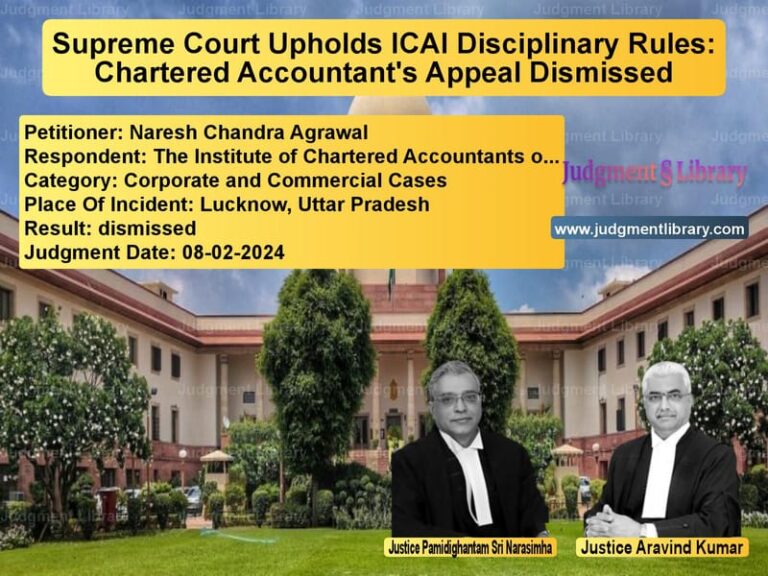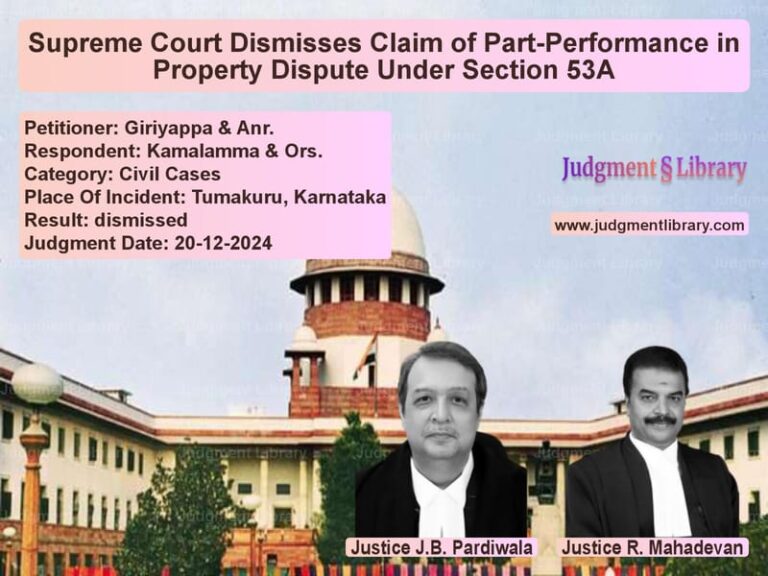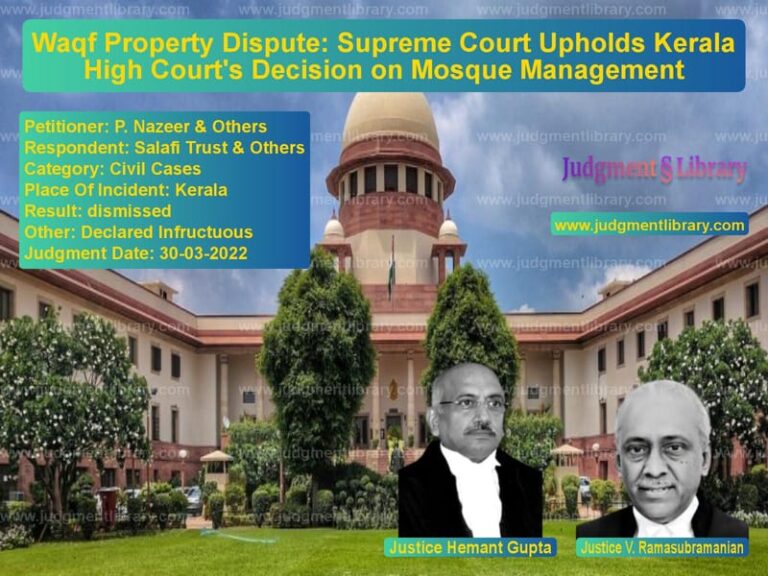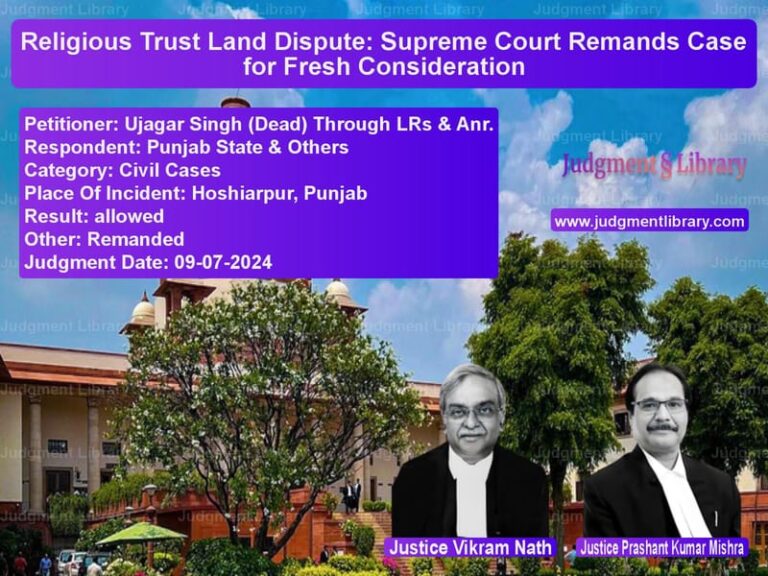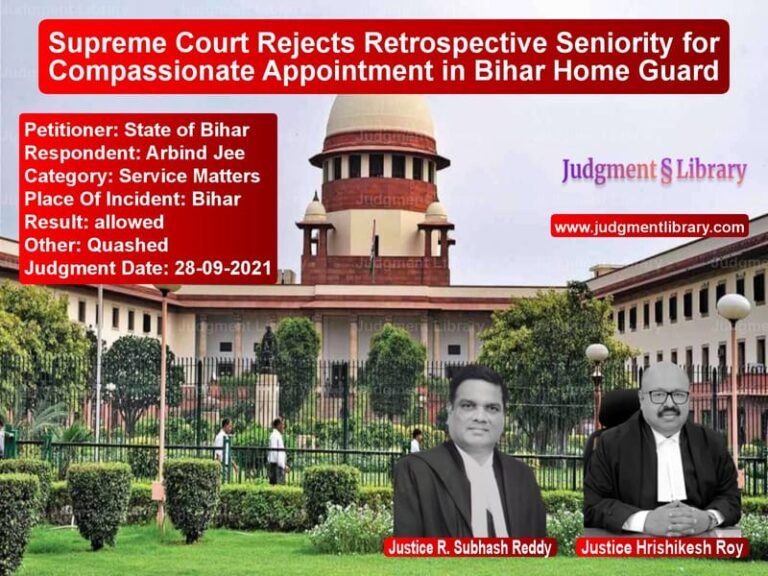Contractual Obligations and Consideration: Supreme Court Rules on Irrigation Restoration Charges Dispute
The case of The Chief Engineer, Water Resources Department & Ors. v. Rattan India Power Limited & Ors. revolves around the legal question of whether a party can dispute the amount of consideration after signing a contract. The Supreme Court examined the binding nature of contractual obligations, especially in cases where the terms of payment were explicitly agreed upon.
Background of the Case
The dispute arose between the Water Resources Department of Maharashtra and Rattan India Power Limited over the payment of irrigation restoration charges. These charges were imposed on industries diverting water originally reserved for irrigation to industrial use. The case had already been litigated in the Bombay High Court, where the High Court reduced the agreed irrigation restoration charges from Rs. 1,00,000 per hectare to Rs. 50,000 per hectare. The Government of Maharashtra challenged this decision before the Supreme Court.
Legal Issues Considered
The Supreme Court analyzed several crucial legal questions:
- Whether a party to a contract can dispute the amount of consideration after signing an agreement.
- Whether the Bombay High Court erred in reducing the irrigation restoration charges.
- The impact of the agreement signed between the parties on May 22, 2012, and the legal principle of estoppel.
- Whether there was any discrimination in charging irrigation restoration fees.
Arguments by the Appellants (Government of Maharashtra)
The appellants contended that:
- The contract clearly stipulated that the respondent would pay Rs. 1,00,000 per hectare as irrigation restoration charges.
- The respondent had explicitly agreed to these charges through an undertaking at the time of signing the contract.
- The High Court’s decision to reduce the charges contradicted the agreement between the parties.
- The respondent was estopped from challenging the amount after having consented to it.
Arguments by the Respondents (Rattan India Power Limited)
The respondents argued that:
- The rate of Rs. 1,00,000 per hectare was introduced after their initial approval, and they should be charged at the earlier rate of Rs. 50,000 per hectare.
- Similarly placed industries were charged lower rates, making the increased fee discriminatory.
- The agreement to pay Rs. 1,00,000 per hectare was not unconditional and was subject to government reconsideration.
- The government’s circular increasing the charges should not apply retrospectively.
Supreme Court’s Judgment
The Supreme Court ruled as follows:
- Contractual obligations are binding: The Court held that once a party has signed a contract agreeing to a specific consideration, it cannot later dispute it.
- Respondent is estopped from challenging the charges: Since Rattan India Power Limited had explicitly accepted the charges in the agreement, they could not claim a reduction.
- Agreement supersedes prior approvals: The Court ruled that the date of the agreement (May 22, 2012) determined the applicable charges, not the earlier approval date.
- No discrimination in charges: The Court found that other entities that received lower rates were in different circumstances, and the charges imposed on the respondent were justified.
- The High Court erred in reducing the charges: The Supreme Court overturned the High Court’s decision, restoring the agreed amount of Rs. 1,00,000 per hectare.
Analysis of the Judgment
This ruling reinforces the principle that contractual commitments must be honored. It prevents parties from renegotiating agreed terms through litigation.
Implications for Contractual Law
- Parties must carefully review agreements before signing, as courts will enforce agreed terms.
- Legal estoppel prevents challenges to contractually agreed fees and obligations.
Implications for Industries Using Water for Non-Irrigation Purposes
- Industries must pay irrigation restoration charges as per the contract terms.
- Retrospective claims for lower charges may not be entertained by courts.
Implications for Government and Policy-Making
- Government bodies must ensure clarity in contracts to avoid legal disputes.
- Policy changes should be communicated clearly to all stakeholders.
Conclusion
The Supreme Court’s judgment upholds the sanctity of contracts and reinforces that once a party agrees to a financial obligation, it cannot later challenge it. This ruling provides clarity for both businesses and government entities regarding contractual commitments and policy enforcement.
Petitioner Name: The Chief Engineer, Water Resources Department & Ors..Respondent Name: Rattan India Power Limited & Ors..Judgment By: Justice S. Ravindra Bhat, Justice Pamidighantam Sri Narasimha.Place Of Incident: Maharashtra.Judgment Date: 13-01-2023.
Don’t miss out on the full details! Download the complete judgment in PDF format below and gain valuable insights instantly!
Download Judgment: the-chief-engineer,-vs-rattan-india-power-l-supreme-court-of-india-judgment-dated-13-01-2023.pdf
Directly Download Judgment: Directly download this Judgment
See all petitions in Contract Disputes
See all petitions in Corporate Compliance
See all petitions in Public Sector Employees
See all petitions in Judgment by S Ravindra Bhat
See all petitions in Judgment by P.S. Narasimha
See all petitions in allowed
See all petitions in Modified
See all petitions in supreme court of India judgments January 2023
See all petitions in 2023 judgments
See all posts in Corporate and Commercial Cases Category
See all allowed petitions in Corporate and Commercial Cases Category
See all Dismissed petitions in Corporate and Commercial Cases Category
See all partially allowed petitions in Corporate and Commercial Cases Category


